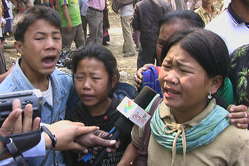 An indigenous woman gathers burnt rice from the ground where her house used to be before Bangalee settlers set it on fire Tuesday last. The photo was taken yesterday at Satbaiyapara in Khagrachhari. Photo: Star
An indigenous woman gathers burnt rice from the ground where her house used to be before Bangalee settlers set it on fire Tuesday last. The photo was taken yesterday at Satbaiyapara in Khagrachhari. Photo: StarOver two thousand adivasis were still hiding in deep forests in Baghaichhari yesterday, although a peace process had begun in the ethnic violence torn hill districts of Khagrachhari and Rangamati through formation of peace committees, and bringing out of peace marches.
"Let peace return, we will return home. I haven't heard yet that normalcy has returned, and we all are staying in the jungle. We don't feel that peace has returned," Kishore Chakma told The Daily Star over the phone last evening, whose house was set on fire by Bangalee settlers.
In Baghaichhari of Rangamati around 1,500 adivasis became homeless as their 357 houses situated in Rethkaba, Surunala, Jarulchhara, Hazachhara, Deepu Para, Dane Bhaibachhara, Bame Bhaibachhara, Gangaram Mukh, Naya Para, and Panbari villages were set on fire by Bangalee settlers. All of them fled to the forests in search of safety.
Many other adivasis fled as well, fearing similar attacks.
Around 100 houses of the settlers were also set on fire by adivasis in retaliation, in the same villages, making around 400 Bangalees homeless.
"We want to return home, but we are afraid. If the government ensures our safety we will return home right at this moment," said Bhanga Chakma on Wednesday, coming out of hiding to get government relief distributed by Rangamati district administration at Gangaram Mukh.
"We are living under trees in forests where we think it is safer. We don't have a single penny in our pockets, as we left our houses only with the clothes we were wearing. I had only 600 taka as my savings inside the house, but that was burnt in the fire," said Sujan Chakma of Gangaram Mukh over the phone yesterday.
Many adivasi families got separated as they fled to the forests. Many survivors do not know where there family members are. Some do not even know where their injured relatives had been admitted for treatment, whether they are still alive or not.
"We don't know how he is in the hospital. We can't go there, but heard at first he was admitted to Baghaichhari Hospital and then transferred to Khagrachhari Hospital," said Shantimoy Chakma over the phone yesterday, younger brother of Bharat Jyoti Chakma who had taken a bullet to the leg on February 19.
Not a single house is standing in the affected villages of Baghaichhari except some charred wooden pillars.
From hill tops, the villages look like ugly black spots in a lush green landscape. Banana orchards were also not spared, they now look like they were trampled by herds of wild elephants.
The River Kasalong also seemed lifeless on Wednesday, as bamboos cut down by the adivasi people for transporting to Karnaphuli Paper Mills, remained abandoned and floating on the river for miles, since the people who would transport those had gone into hiding.
"I wonder whether I should go back to Mizoram or somewhere else far away from this place, since I have been repeatedly made homeless here," said Hridoy Ranjan Chakma, a 68-year old resident of Gangaram Mukh, as he looked at his burnt down house on Wednesday.
Hridoy lost his first home at Mainee of Rangamati in 1979 in a similar riot and fled to Mizoram. He lived in Mizoram until 1997 when the Chittagong Hill Tracts Peace Treaty was signed.
After the signing of the treaty he returned to Gangaram Mukh where he had grown up, thinking finally peace would be established on the beautiful hills that he loves so much.
But his dream was shattered when he lost his house once again to ethnic violence in 2008. And this month he lost his home for the third time.
Hridoy is now hiding in a forest, and thinking hard whether another self exile instead of a dream to live in the homeland would be a wiser choice for him.


















































 Pickets burn firewood at Mohazonpara in Khagrachhari sadar upazila Tuesday morning to enforce a daylong road and waterway blockade. Photo: Star
Pickets burn firewood at Mohazonpara in Khagrachhari sadar upazila Tuesday morning to enforce a daylong road and waterway blockade. Photo: Star
